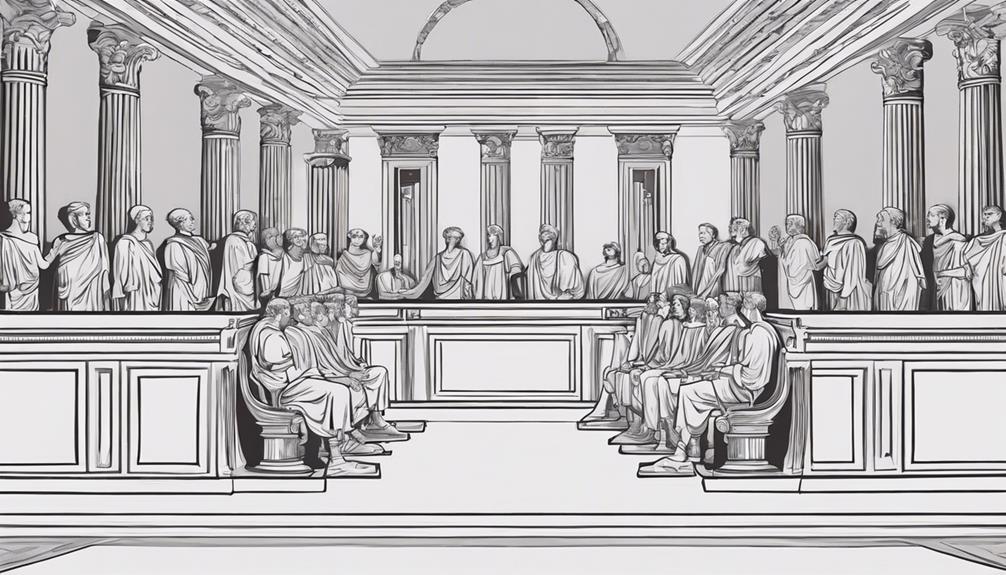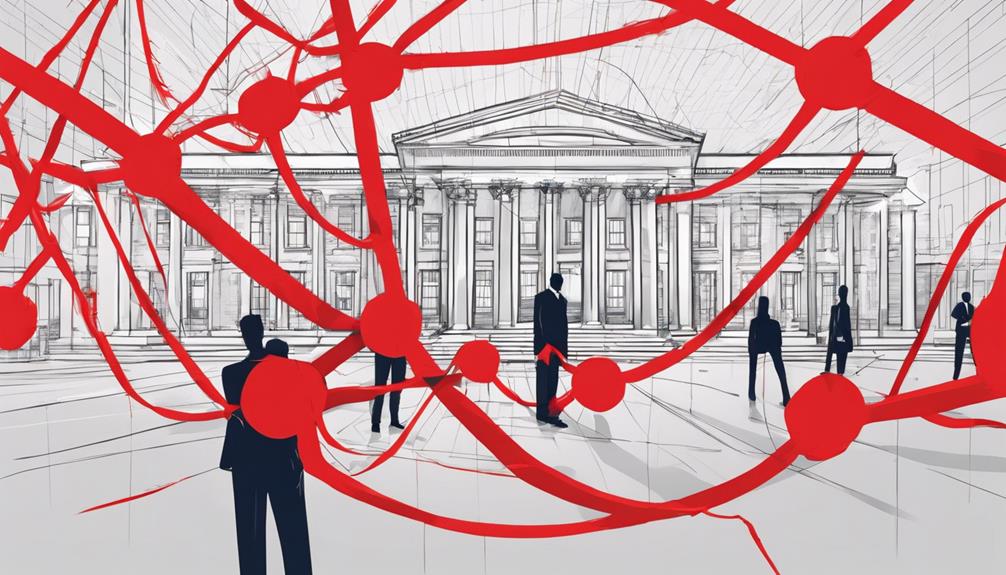The question of how we should govern ourselves stands as a cornerstone of societal development. In navigating the complexities of contemporary challenges, the need for effective governance models becomes increasingly paramount. From the intricate interplay of power dynamics to the delicate balance between individual liberties and collective responsibilities, the landscape of governance is ever-shifting. As we contemplate the path forward, exploring innovative approaches and reflecting on historical precedents offer invaluable insights. So, how do we forge a path towards a more equitable and sustainable future?
Key Takeaways
- Embrace subsidiarity in governance for effective decision-making at local levels.
- Uphold transparency, accountability, and citizen participation for trustworthy governance.
- Maintain a balance of power and accountability to prevent abuses and ensure fairness.
- Learn from historical governance to enhance present-day structures and address challenges.
The Concept of Governance

What fundamental principles underlie the concept of governance and its role in societal organization and management? Governance in the United States, particularly concerning climate change, often involves a complex interplay between federal, state, and local authorities. While the federal government sets overarching policies and regulations, local authorities play a crucial role in implementing these measures at the community level. Climate change governance requires coordination and collaboration among various levels of government to address this global challenge effectively.
In the context of climate change, the principle of subsidiarity, which advocates for decisions to be made at the most local level possible, becomes essential. This principle recognizes that local authorities often have a better understanding of their community's unique needs and can tailor governance mechanisms accordingly. By empowering local authorities to take action on climate change, the overall governance framework becomes more responsive and inclusive.
Effective governance in addressing climate change also requires transparency, accountability, and citizen participation. Citizens must have access to information, be able to hold authorities accountable for their actions, and actively participate in decision-making processes. In the United States, these principles are fundamental to ensuring that governance structures effectively mitigate the impacts of climate change on society.
Philosophical Foundations of Democracy
The foundation of democracy, rooted in the insights of ancient Greek philosophers such as Plato and Aristotle, has evolved to encompass key principles of popular sovereignty, political equality, and individual rights. These principles emphasize the importance of citizens having a say in decision-making, ensuring that all individuals have equal opportunities to participate in the political process, and protecting the fundamental rights of each person within society. Democracy also highlights the significance of the rule of law, safeguarding the rights of minorities, and holding leaders accountable for their actions.
Moreover, the theories of modern philosophers like John Locke and Jean-Jacques Rousseau have further influenced democratic thought. Democracy, as a system of governance, seeks to strike a balance between majority rule and the preservation of individual liberties and human dignity. By integrating these philosophical foundations, democratic societies aim to create a framework that promotes civic engagement, protects human rights, and fosters a sense of collective responsibility towards the common good.
Mechanisms of Self-Rule

Exploring the diverse mechanisms of self-rule illuminates the intricate systems through which citizens engage in decision-making processes within a democratic framework.
- Participatory decision making: Involves active involvement of citizens in the decision-making process, allowing them to have a direct impact on policies and laws.
- Direct democracy benefits: Empowers individuals to vote on specific issues, promoting a more direct form of governance and potentially reducing the influence of special interests.
- Representative democracy roles: Citizens elect officials to represent their interests and make decisions on their behalf, striking a balance between direct participation and efficient decision-making.
- Checks and balances: Elements integrated into the system to prevent the concentration of power in any one entity, ensuring accountability and transparency.
- Complexity and effectiveness: The effectiveness of mechanisms of self-rule can vary based on factors like the level of citizen engagement, the design of institutions, and the presence of safeguards against abuse of power.
These mechanisms significantly shape the governance structure of a society, influencing the distribution of power and the extent of citizen involvement in decision-making processes.
Balancing Power and Accountability
Balancing power and ensuring accountability within governance structures is a fundamental requirement for maintaining a just and stable society. Power dynamics play a crucial role in decision-making processes, necessitating a careful balance to prevent the consolidation of authority in a single entity. Accountability structures, including transparency measures, oversight mechanisms, and checks and balances, are essential in distributing power effectively. These mechanisms help uphold the rule of law, promote democracy, and protect the rights of citizens by preventing abuse of power.
Leadership responsibility is paramount in maintaining public trust and confidence in governance institutions. Leaders and institutions must be held accountable for their actions and decisions to ensure that they act in the best interests of the populace. Limiting the authority of any one entity is key to safeguarding against potential abuses and ensuring that diverse interests are represented fairly.
In essence, the delicate equilibrium between power and accountability is vital for the effective functioning of governance systems and the preservation of a just and democratic society.
Historical Perspectives on Governance

Historical perspectives on governance offer a lens through which we can trace the development of power dynamics and decision-making structures throughout human history. By examining ancient governance structures, the evolution of governance systems, and the challenges faced by modern governance, we gain insight into the complexities and nuances of governing societies. Understanding the historical context of governance provides a foundation for evaluating the strengths and weaknesses of different forms of governance and informs discussions on how we should govern ourselves in the present day.
Ancient Governance Structures
Ancient governance structures across various civilizations exhibited a spectrum of political systems, from the democratic practices of city-states like Athens to the authoritarian rule seen in empires such as Rome.
- Athenian democracy and Mesopotamian laws
- Egyptian pharaohs and Chinese dynasties
- Roman Senate and Confucian hierarchy
These examples showcase the diverse methods of governance employed by ancient societies. The Code of Hammurabi in Mesopotamia set clear laws and punishments, while Egypt centralized power under pharaohs. Chinese dynasties utilized Confucian principles to maintain social order, and the Roman Senate played a crucial role in the Republic's governance. Understanding these ancient governance structures provides valuable insights into the evolution of political systems throughout history.
Evolution of Governance
The historical development of governance structures reflects a shift from centralized authority towards more intricate systems characterized by varying levels of power distribution and control mechanisms. Democratic transitions have played a significant role in controlling the concentration of power within governance dynamics. Sovereignty limitations, as evidenced by international agreements on human rights, have curbed the absolute power of states in governing their populations. Events like Brexit exemplify peaceful constitutional upheavals within governance contexts, showcasing the adaptability of governance systems. Bureaucracy, often seen as a tool to manage conflicts, promote stability, and ensure efficient governance, has been instrumental in shaping the evolution of governance structures. As governance continues to evolve, the balance between centralized authority and distributed power remains a critical aspect of effective governance.
Modern Governance Challenges
Examining the evolution of governance structures provides valuable insights into the challenges modern societies face in effectively managing their systems of authority and control.
- Historical perspectives on modern governance challenges highlight the complexities of balancing individual liberties with societal needs in contemporary frameworks.
- Understanding past governance issues can inform decision-making processes on democratic participation in current governance systems.
- Lessons from historical governance failures and successes are crucial in enhancing governance effectiveness in present-day societies.
- Regulatory compliance remains a significant challenge in modern governance, drawing parallels from historical regulatory issues.
- Analyzing historical governance models can illuminate the intricacies of governing societies today, offering guidance on navigating modern governance challenges.
Challenges to Democratic Governance

The challenges facing democratic governance are multifaceted, including threats to the democratic process, corruption in political systems, and voter apathy. These issues can undermine the foundation of democracy by eroding trust in institutions and diminishing the effectiveness of representation. Addressing these challenges requires a comprehensive approach that prioritizes transparency, accountability, and civic engagement to safeguard the principles of democracy.
Threats to Democracy
In analyzing the current landscape of democratic governance, it is evident that various formidable challenges threaten the foundational principles of democracy.
- Disinformation threats: Misleading information spread with the intent to deceive the public can undermine trust in democratic processes.
- Authoritarian erosion: The gradual weakening of democratic institutions and principles in favor of autocratic rule poses a significant threat to democracy.
- Civil liberties concerns: Issues surrounding individual freedoms, privacy, and rights have become increasingly prominent, impacting the democratic fabric of society.
- Manipulation of information: The deliberate distortion of facts and data to influence public opinion can manipulate democratic outcomes.
- Foreign interference: External actors meddling in domestic affairs through various means can disrupt the integrity of democratic processes.
Corruption in Politics
Given the pervasive influence of corruption in politics, it stands as a formidable obstacle to upholding the principles of democratic governance. Political corruption creates ethical dilemmas, eroding public trust in institutions and compromising the fairness of decision-making processes. Transparency and accountability measures are essential to combat this issue, as they help expose and deter corrupt practices within governance systems. Without these safeguards, the risk of abuse of power and manipulation for personal gain remains high, undermining the integrity of the entire political structure. Studies consistently show that countries with higher levels of corruption tend to experience slower economic development, poorer public service quality, and increased social inequality. Upholding governance integrity through anti-corruption strategies is vital to fostering a healthy democratic environment and rebuilding public confidence in the system.
Voter Apathy Impact
Amidst the complex landscape of democratic governance, voter apathy poses a critical challenge with its potential to undermine the legitimacy and representativeness of electoral processes. Impact analysis reveals that low voter turnout, as seen in the 2020 U.S. presidential election at around 66%, indicates a significant portion of eligible voters abstained from participating. Reasons for voter apathy, ranging from disillusionment with political candidates to voter suppression tactics, contribute to this phenomenon. Consequently, democratic legitimacy is at risk when elected officials do not accurately represent the diverse public opinion due to voter apathy. To address this issue, strategies focusing on voter engagement, education, improved voting access, and increased transparency in political processes are crucial in bolstering democratic governance.
Innovations in Governance Systems

Enhancing governance systems through innovative models such as Northcote-Trevelyan 3.0, User-centred AI state, and Mutual Aid state is crucial for addressing complex community needs and ensuring consistent service delivery. These models emphasize enhancing citizen service experience, promoting sustainable development, leveraging technological advancements, and fostering greater participation in decision-making processes. By incorporating elements from these models, future leaders can create more comprehensive solutions to the multifaceted challenges faced by societies today.
| Innovative Governance Models | Key Focus Areas |
|---|---|
| Northcote-Trevelyan 3.0 | Sustainable development, Citizen service experience, Comprehensive solutions |
| User-centred AI state | Technological advancements, Decision-making efficiency, Resource allocation |
| Mutual Aid state | Community needs, Consistent service delivery, Enhanced participation |
Balancing the improvement of living standards with the imperative of transitioning to Net Zero emissions stands out as a critical focal point in these innovative governance approaches. The integration of AI in governance systems offers promising prospects to mitigate complexity risks, enhance decision-making processes, and optimize resource allocation efficiency for the benefit of society as a whole.
Future Possibilities for Self-Governance
The evolution of self-governance towards greater efficiency and inclusivity necessitates a strategic reimagining of traditional governance frameworks. As we explore future possibilities for self-governance, several key factors come into play:
- Citizen empowerment: Empowering citizens through participation in decision-making processes can lead to more representative and responsive governance.
- Digital transformation: Leveraging technology for transparent communication, efficient service delivery, and data-driven decision-making can enhance governance structures.
- AI governance: Implementing ethical frameworks for AI use in governance can optimize resource allocation, improve decision-making processes, and enhance service delivery.
- Community engagement: Fostering active community involvement in governance can ensure that policies and services meet the diverse needs of the population.
- Service delivery, sustainable development: Prioritizing sustainable development goals in service delivery can lead to long-term benefits for society and the environment, ensuring a more resilient and equitable future.
Frequently Asked Questions
How Can Individuals Actively Participate in the Governance Process?
Individuals can actively participate in the governance process through civic engagement, such as joining grassroots movements or participating in community councils. They can also engage in participatory budgeting, where citizens have a say in how public funds are allocated. Additionally, individuals can promote direct democracy by supporting citizen initiatives that allow the public to propose and vote on laws directly. These avenues empower citizens to have a direct impact on decision-making processes.
What Role Do Non-Governmental Organizations Play in the Governance Structure?
Non-governmental organizations act as the delicate threads in the tapestry of governance, representing civil society's voices and ensuring accountability. Through grassroots movements and advocacy, they bring public attention to critical issues, driving change from the ground up. Collaborating in public-private partnerships, NGOs bridge gaps, fostering a more inclusive and transparent governance structure. Their role is pivotal in shaping policies and holding both governments and corporations accountable to the public they serve.
How Do Cultural Factors Influence the Effectiveness of Self-Governance Systems?
Cultural norms heavily influence the effectiveness of self-governance systems, shaping decision-making processes, leadership styles, and conflict resolution strategies. Social cohesion is impacted by how power dynamics are perceived within a culture, which in turn affects the ability of a community to self-govern. Understanding these cultural factors is essential for designing governance structures that are responsive to the needs and values of a particular society.
What Are the Potential Drawbacks of Decentralized Governance Models?
Potential drawbacks of decentralized governance models include power imbalances, which can lead to unequal distribution of resources and decision-making authority. The decision-making process may become fragmented, slowing down progress and creating inefficiencies. Additionally, without robust accountability mechanisms in place, decentralized systems may struggle to maintain transparency and oversight, increasing the risk of corruption and mismanagement. These challenges highlight the need for careful consideration when implementing decentralized governance structures.
How Do Advancements in Technology Impact the Way We Govern Ourselves?
Advancements in technology have revolutionized the way we govern ourselves by fostering tech innovation in the democratic process. Digital citizenship and political engagement have been amplified through online platforms, enabling broader participation in policy implementation. However, challenges arise, such as ensuring inclusivity and safeguarding against misinformation. Understanding these dynamics is crucial for leveraging technology to enhance governance effectiveness while upholding democratic values and principles.
Conclusion
In conclusion, the evolution of governance models and the challenges we face in governing ourselves require a careful balance between meeting the needs of society and addressing pressing global issues. As we navigate the complexities of modern governance, it is essential to consider innovative approaches and future possibilities that can enhance citizen service experience and ensure effective delivery. The future of self-governance holds great potential for addressing complex community needs and achieving sustainable outcomes.
